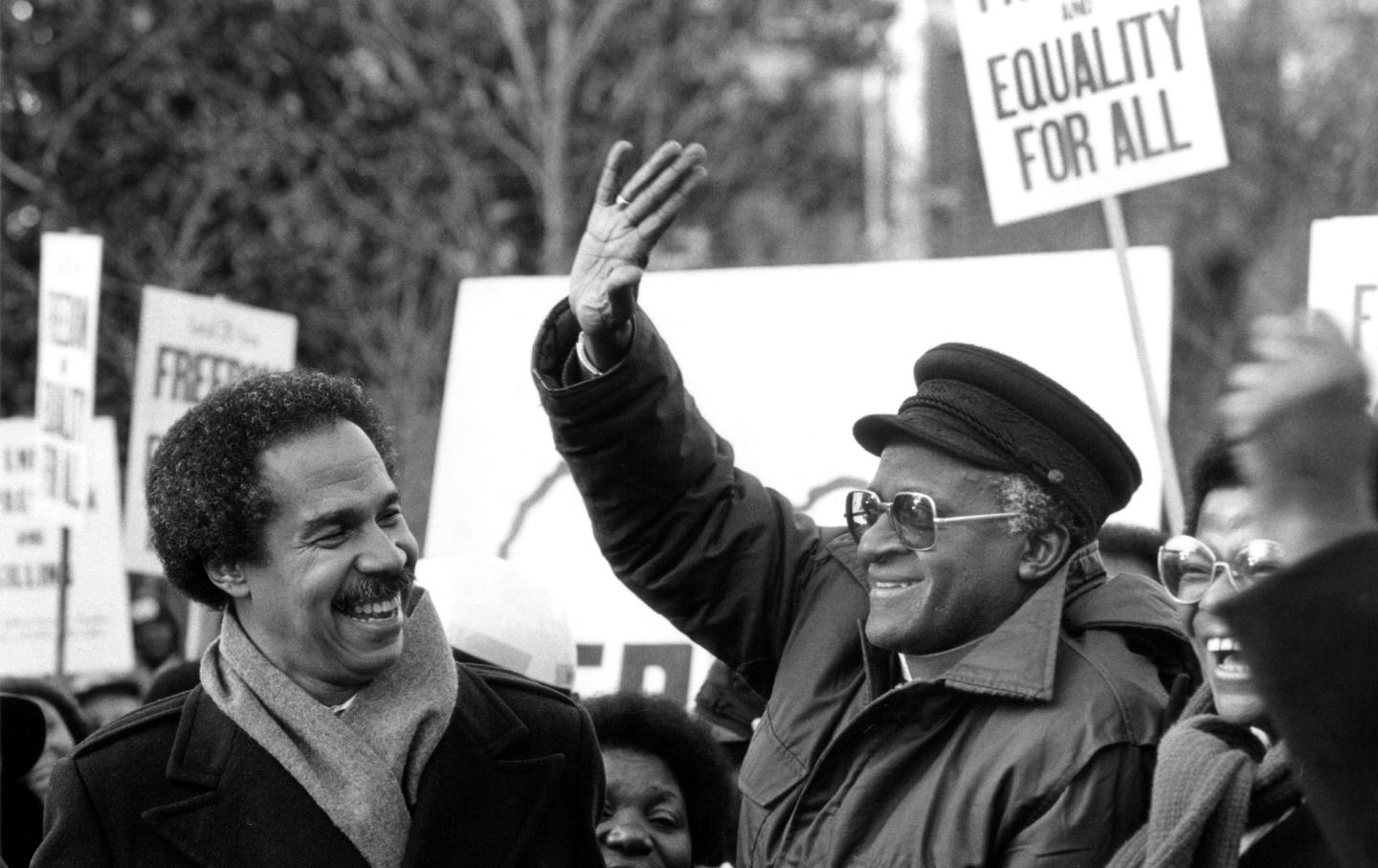
Randall Robinson, executive director of TransAfrica (left) with Archbishop Desmond Tutu at a demonstration at the South African embassy in 1984.(Rick Reinhard)
When I arrived in Washington, D.C., in the summer of 1978, I didn’t have high hopes for TransAfrica, a newly formed organization created only a year earlier with a young leader, Randall Robinson, at its helm. I was convinced that we did not need another liberal organization that saw compromise as a path to freedom for oppressed people, and which would be unwilling to confront imperialist nations still bent on exploiting Africa and the African world. As history and my own life went on to show, my initial impression of TransAfrica, and of Randall, who died on March 24 at the age of 81, was sorely mistaken.
I eventually met Randall in 1979, after becoming a member of the Southern Africa Support Project (SASP), a Washington, D.C.–based solidarity organization that was known for its activism and support of struggles in southern and South Africa. SASP, as it was known, had forged a productive working relationship with TransAfrica and with Randall, creating a new dynamic for activists seeking to change US policy toward Africa and the African diaspora. Randall had gathered under one roof a talented group of young researchers, media folk, former diplomats, and labor and academic leaders who represented a variety of activist traditions. It was an exciting moment for several reasons, the most important being Randall’s own history.
Randall, although firmly planted in the Washington world of bureaucrats, diplomats, and lawmakers, still carried with him the radical instincts that came to define his leadership. I, along with other members of SASP and activists everywhere, came to cherish Randall’s rebellious side. This had been nurtured during his life as a student and community activist with the Gulf Oil Boycott campaign and organizations in Boston in the early 1970s such as the Pan-African Liberation Committee and the Southern Africa Relief Fund. These experiences informed his interactions with community-based solidarity groups like SASP, with activist union leaders at the national and grassroots levels, and with the students, church leaders, and other organizations that actively supported anti-colonial liberation movements around the world. Randall was not afraid to ruffle feathers; in 1983, he extended an invitation to Prime Minister of Grenada Maurice Bishop—vilified by the Reagan administration as a Marxist dictator—to speak at TransAfrica’s annual gala. Four months later, Bishop was assassinated in a coup, and US troops invaded Grenada.
Over the years, I came to know Randall not just as a comrade but also as a brother—one who rarely forgot a name or face and who was prone to retelling old Richard Pryor jokes. In his less guarded moments (he was a somewhat private person), it was clear that he carried his history as a Black man from Richmond, Va., and a graduate of the historically Black Virginia Union University, as points of pride—and also as shields against the racism he encountered throughout his life.
If you were fortunate enough to have heard him, either in private conversations or during his many public presentations, you would understand him to be the heir to an important tradition in the African American community of an intellectually grounded and transgressive activism that often distinguished him from establishment leaders who may have seen his approach as confrontational. This, I believe, is what motivated him, and us, to work for change even though we had been excluded from the foreign policy elite. He spoke directly of the need to keep grassroots organizations from all communities involved in conversations that usually excluded them.
It was Randall, his staff at TransAfrica, and a handful of other committed organizations around the country who realized that legislative work that took place in Congress could achieve little without the support of the activists or the masses, as we called them—students, workers, and everyday people, many of whose own conditions made it possible for them to find common cause with those struggling in South Africa. Randall’s insights helped to make those connections clear. And, as important, we felt that his leadership of TransAfrica amplified our voice and expanded the power of our solidarity movement. The success of the Free South Africa Movement, founded in November 1984 and most associated with Randall and TransAfrica, serves as a testament to the power of bringing many groups together to fight against injustice.
Many people and organizations felt connected to Randall, particularly after he stepped down from the leadership of TransAfrica and began publishing a series of well-received memoirs and social critiques. And, although I write this in praise of his life and work, I am deeply aware that “his” work encompasses that of so many others who traveled the same roads as he did—often without recognition but in, as we say, the tradition. Hamba Kahle, Randall Robinson! You will not be forgotten!
Joseph F. JordanJoseph F. Jordan is the vice provost for academic and community engagement and an associate professor of African/African American and Diaspora Studies at the University of North Carolina at Chapel Hill.